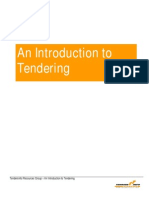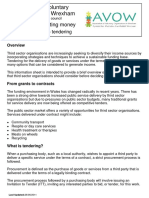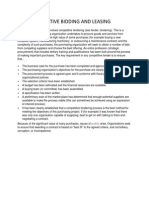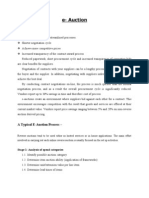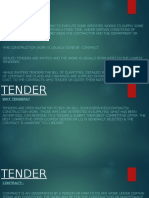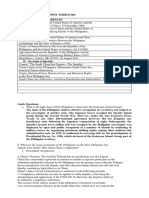Five Steps of A Bidding Process: Specifications
Uploaded by
Sanika GhoshFive Steps of A Bidding Process: Specifications
Uploaded by
Sanika GhoshProcess in which transportation agency requests contractors to submit proposals for the construction of transportation infrastructure..
Five Steps of a Bidding Process
If you run a small business, you might engage in the bidding process regularly. Whether you are the one accepting the bids or you have to bid on jobs, the basic steps are typically the same. Completing the bidding process in the proper manner could be the difference between getting a bid or looking for work.
Specifications
The first step in the bidding process deals with coming up with the specifications for the job. The company or customer looking for bids has to develop specifications for the bidding process. For example, if the customer needs a building constructed, a schematic or blueprints must be developed first. All of the details for the entire project must be outlined in the documentation.
Request for Bids
After the details of the project have been developed, the customer must request that bids be made. This can involve sending out invitations to bid on projects and posting the opportunity online. In some cases, the client will only request bids from a pre-selected list of contractors. In other situations, the bid opportunity may be open to anyone who qualifies to bid on it.
Bidding
After the information about the project has been distributed to contractors, the bidding process begins. The bidding process can differ, depending on the rules set by the client. In some cases, sealed bids will be submitted and the customer will evaluate them. In other cases, a more informal bidding process will be involved in which contractors simply give a total amount that they can do the job for.
Reviewing the Bids
The customer will typically set a deadline on when the last bids will be accepted. Once that deadline is reached, the customer will begin reviewing the bids. The length of time that it takes to review the bids could vary, depending on the number of bids received.
Awarding the Contract
After the bids have been thoroughly reviewed, the customer will award the contract to one bidder. In most cases, the bidder with the lowest bid wins. In some situations, the bidder will award the contract not only on price but other factors as well. For instance, the customer may be inclined to go with a more reputable provider or with those where a prior relationship exists.
tender process The process of issuing a Request for Information, Request for Proposal and Supplier Contract to select and contract a preferred supplier...
Tendering is the process of making an offer, bid or proposal, or expressing interest in response to an invitation or request for tender. Organisations will seek other businesses to respond to a particular need, such as the supply of goods and services, and will select an offer or tender that meets their needs and provides the best value for money. Tender request documents; also referred to as invitations to tender, Requests for Tender (RTF), Requests for Proposal (RFP) etc outline what is required, that is, what the requesting organisation's needs are. These documents also outline the particular requirements, criteria, and instructions that are to be followed. Future tenders are generally widely advertised to offer opportunities to a number of suppliers, encourage competition and provide a greater pool of offers to select from. Interested suppliers will then prepare a tender; the documents that outline the offer that they are making, and will include pricing, schedules as well as their eligibility for the project or procurement.
They will outline their advantage over competitors; provide information on qualifications, competencies and experience. Further they have to demonstrate how their bid offers the best value for money. The submitted tenders are then evaluated with regard to defined criteria. In a normal tendering situation, this process should be conducted fairly and honestly, and in a manner that is free from bias or favour. The offer that best meets all of the requirements outlined in the request, and provides value for money should win the contract. The tendering process is generally utilised for procurements or contracts involving substantial amounts of money. Tendering is utilised by:
Government departments, offices and agencies Private sector companies and businesses Overseas markets and businesses While the concept of tendering may seem daunting at first, it can be easily tackled by having a plan of attack'. When becoming involved in a tendering process, it is important to understand your business' suitability for the project; whether your business' current situation will allow for you to tender, as well as your ability to manage the contract if you are successful in winning the tender. By understanding these points and ensuring you can demonstrate that you are able to meet the criteria and offer a competitive bid, you will increase your chances of success. The seven main steps in the tender process are: 1. Tender process is determined: the organisation requesting the tender will determine the type of tender that will be used, as well as what will be involved in the tender process. 2. Request for tender is prepared: the request for tender outlines what is required, the contractual requirements and how you should respond. 3. Tenders are invited: the value, complexity and business category determine how tenders are invited. 4. Suppliers respond: you should first obtain all relevant documentation. Then: a. Attend any pre tender briefing sessions being conducted b. Clarify any uncertainties c. Plan your response d. Prepare your response e. Submit your response in the right format, on time and at the right location 5. Evaluation and selection: each tender will be checked for compliance, and if compliant, then evaluated against the criteria specified in the tender documentation. The tender that offers best value for money will win the business. 6. Notification and debriefing: when a contract has been awarded, the successful tenderer will be advised in writing of the outcome. Unsuccessful tenderers are also advised and offered a debriefing interview. 7. Contracts established and managed: generally a formal agreement will be required between the successful tenderer and the relevant agency.
AUCTION
Initial ConsultationWe know time is a critical factor in the sale of any property. So we make the most of
your time, right from the start. It all begins with a confidential consultation that will set the stage for an active and engaging auction process. At this initial consultation, a United Country Auction Services professional will: Provide an in-depth review of the process. Convey recent industry trends. Gather appropriate property information. Conduct an informal property inspection. Discuss next steps and develop timeline.
Market AnalysisUnited Country Auction Services conducts a thorough market analysis so that we may
apply our time and resources in a way that will have the greatest impact. The market analysis gives us a
clear picture of the current market and potential buyers. Its the foundation we use to effectively promote your property and to help ensure that you receive fair market value. At this stage, United Country Auction Services professionals will: Conduct market comparable analysis. Match your property to our extensive database of more than 23,000 listings. Research demographics of potential buyers. Create a market analysis report for you.
Marketing Plan DevelopmentWith a clear understanding of the market, United Country Auction Services
will be ready to put together a plan that makes the most effective use of our powerful sales and promotional tools. We have more than 50 full-time staff members in our home office who are ready to put their industry-leading marketing, media buying and creative talents to work for you. Possible outlets for reaching buyers on a local, national and global level include: Internet marketing on websites that are viewed more than 28,000 times per day Custom website development for your property Advertising in real estate publications that reach more than 90 million homes per week Dedicated call center
Marketing Plan ImplementationOver the next several weeks, United Country Auction Services will carry out
the marketing plan that will reach a broad audience of potential buyers and help generate enthusiasm for your property. Our ability to promote your property is unique and unmatched. Only United Country Auction Services offers you: Inclusion within our national listings Access to our exclusive client base of 300,000 buyers The preeminent technology team in the industry Our executive staff of proven industry leaders
Auctioning Your PropertyUnited Country Auction Services offers comprehensive event planning and
consultation services. Were always looking ahead and working to ensure that your big day goes just as planned. Plus, our technical service capabilities including online simulcast ensure that more buyers have a chance to bid on your property. Let us take care of all the event details, including: Online auction services Technology to support multi-parcel auctions Contract facilitation services Earnest money management
Post-Auction ClosingOnce the event has concluded, United Country Auction Services will tie up all the
loose ends associated with transferring ownership of a property. To help ensure that your experience remains pleasant and hassle-free to the very end, we will: Process titles and other documents. Coordinate closing. Provide seller recap and reporting. Remain in contact with you as needed.
OEM and their impact on pricing policies
An original equipment manufacturer, or OEM, manufactures products or components that are purchased by another company and retailed under that purchasing company's brand name. OEM refers to the company that originally manufactured the product. When referring to automotive parts, OEM designates a replacement part made by the manufacturer of the original part.
You might also like
- Tendersinfo Resources Group - An Introduction To TenderingNo ratings yetTendersinfo Resources Group - An Introduction To Tendering28 pages
- Bidding Procedure and Qualification RequirementNo ratings yetBidding Procedure and Qualification Requirement23 pages
- Business Mastery 101: Navigating Complex Bidding Processes: Business Mastery, #101From EverandBusiness Mastery 101: Navigating Complex Bidding Processes: Business Mastery, #101No ratings yet
- Submitting Winning Government Tenders and Compliant Bids100% (1)Submitting Winning Government Tenders and Compliant Bids3 pages
- Association of Voluntary Organisations in Wrexham: 7. Finding and Getting MoneyNo ratings yetAssociation of Voluntary Organisations in Wrexham: 7. Finding and Getting Money6 pages
- Essential Reading: Fundamentals of A TenderNo ratings yetEssential Reading: Fundamentals of A Tender12 pages
- Topic 3 - Lecture III - Procurement MethodsNo ratings yetTopic 3 - Lecture III - Procurement Methods20 pages
- Tender Process In:: Private & Government Sector & Their DifferencesNo ratings yetTender Process In:: Private & Government Sector & Their Differences9 pages
- Landscape Project Management and Professional Practice: Assignment 5-Question PapersNo ratings yetLandscape Project Management and Professional Practice: Assignment 5-Question Papers14 pages
- Process of Tender: Presented By:-Abhinav, Adityan, Afreen, Amir, Gursharan, Hamdan, Mayank, Salman, Sumaiya, TalhaNo ratings yetProcess of Tender: Presented By:-Abhinav, Adityan, Afreen, Amir, Gursharan, Hamdan, Mayank, Salman, Sumaiya, Talha25 pages
- The Tasks Associated With Each Stage of The Sourcing Process - TranscriptNo ratings yetThe Tasks Associated With Each Stage of The Sourcing Process - Transcript5 pages
- Cpntracts and Accounts Microproject PDFNo ratings yetCpntracts and Accounts Microproject PDF11 pages
- Reverse Auction:: Auction Is A Process Used To An Item ToNo ratings yetReverse Auction:: Auction Is A Process Used To An Item To10 pages
- Module 4 - COMPETITIVE BIDDING AND NEGOTIATIONNo ratings yetModule 4 - COMPETITIVE BIDDING AND NEGOTIATION16 pages
- Bidding and Evaluation Processes in Public Procurement Management50% (2)Bidding and Evaluation Processes in Public Procurement Management17 pages
- Group Assignment: Direct and Interactive CommunicationNo ratings yetGroup Assignment: Direct and Interactive Communication7 pages
- Project Procurement Management: by "Training Mile" - A Training & Management CompanyNo ratings yetProject Procurement Management: by "Training Mile" - A Training & Management Company11 pages
- (2004) 5 BOM CR 214.: Ramesh Pimple v. Central Board of Film Certification, (2004) 3 MAH LJ 746, 750No ratings yet(2004) 5 BOM CR 214.: Ramesh Pimple v. Central Board of Film Certification, (2004) 3 MAH LJ 746, 7502 pages
- Auto Repair Receipt Template 11-07-86ep8n0vtNo ratings yetAuto Repair Receipt Template 11-07-86ep8n0vt2 pages
- The Functions of The Delphic Amphictyony Before 346 BCE1: Hugh BowdenNo ratings yetThe Functions of The Delphic Amphictyony Before 346 BCE1: Hugh Bowden17 pages
- Ray v. SATF-SP Corcoran II Medical Department - Document No. 4No ratings yetRay v. SATF-SP Corcoran II Medical Department - Document No. 41 page
- Teza de Doctorat - Cordos George-SilviuNo ratings yetTeza de Doctorat - Cordos George-Silviu199 pages
- Strategic Asset Management Plan 2021 22No ratings yetStrategic Asset Management Plan 2021 2246 pages
- IDEOLOGICAL ANALYSIES ON The WOMEN ON THE EDGE OF TIMENo ratings yetIDEOLOGICAL ANALYSIES ON The WOMEN ON THE EDGE OF TIME6 pages
- Stage 5: "Advice From A Caterpillar": Excerpt From The Original NarrativeNo ratings yetStage 5: "Advice From A Caterpillar": Excerpt From The Original Narrative3 pages
- Case Digest - Legal Ethics March 5 - Manila Doctors Hospital V Chua100% (2)Case Digest - Legal Ethics March 5 - Manila Doctors Hospital V Chua2 pages
- Legislative Process in Pakistan: Imtiaz YousafNo ratings yetLegislative Process in Pakistan: Imtiaz Yousaf10 pages
- P.S.Swathi Ssim: Corporate Governance: Theories, Principles, PracticesNo ratings yetP.S.Swathi Ssim: Corporate Governance: Theories, Principles, Practices20 pages
- 2014-03-03 - AS FILED - Byrom Response To Motion To ResetNo ratings yet2014-03-03 - AS FILED - Byrom Response To Motion To Reset9 pages
- Ccourt I: Demand Letter For Unlawful DetainerNo ratings yetCcourt I: Demand Letter For Unlawful Detainer2 pages
- Ethics Formation and Transformation of SelfNo ratings yetEthics Formation and Transformation of Self19 pages
- Tamil Nadu Occupants of Kudiyiruppu (Protection From Eviction) Re PDFNo ratings yetTamil Nadu Occupants of Kudiyiruppu (Protection From Eviction) Re PDF3 pages
- Download full Test bank for Atmosphere 12th 0321833589 / 9780321833587 all chapters100% (13)Download full Test bank for Atmosphere 12th 0321833589 / 9780321833587 all chapters61 pages
- Tendersinfo Resources Group - An Introduction To TenderingTendersinfo Resources Group - An Introduction To Tendering
- Business Mastery 101: Navigating Complex Bidding Processes: Business Mastery, #101From EverandBusiness Mastery 101: Navigating Complex Bidding Processes: Business Mastery, #101
- Submitting Winning Government Tenders and Compliant BidsSubmitting Winning Government Tenders and Compliant Bids
- Association of Voluntary Organisations in Wrexham: 7. Finding and Getting MoneyAssociation of Voluntary Organisations in Wrexham: 7. Finding and Getting Money
- Tender Process In:: Private & Government Sector & Their DifferencesTender Process In:: Private & Government Sector & Their Differences
- Landscape Project Management and Professional Practice: Assignment 5-Question PapersLandscape Project Management and Professional Practice: Assignment 5-Question Papers
- Process of Tender: Presented By:-Abhinav, Adityan, Afreen, Amir, Gursharan, Hamdan, Mayank, Salman, Sumaiya, TalhaProcess of Tender: Presented By:-Abhinav, Adityan, Afreen, Amir, Gursharan, Hamdan, Mayank, Salman, Sumaiya, Talha
- The Tasks Associated With Each Stage of The Sourcing Process - TranscriptThe Tasks Associated With Each Stage of The Sourcing Process - Transcript
- Reverse Auction:: Auction Is A Process Used To An Item ToReverse Auction:: Auction Is A Process Used To An Item To
- Bidding and Evaluation Processes in Public Procurement ManagementBidding and Evaluation Processes in Public Procurement Management
- Group Assignment: Direct and Interactive CommunicationGroup Assignment: Direct and Interactive Communication
- Project Procurement Management: by "Training Mile" - A Training & Management CompanyProject Procurement Management: by "Training Mile" - A Training & Management Company
- (2004) 5 BOM CR 214.: Ramesh Pimple v. Central Board of Film Certification, (2004) 3 MAH LJ 746, 750(2004) 5 BOM CR 214.: Ramesh Pimple v. Central Board of Film Certification, (2004) 3 MAH LJ 746, 750
- The Functions of The Delphic Amphictyony Before 346 BCE1: Hugh BowdenThe Functions of The Delphic Amphictyony Before 346 BCE1: Hugh Bowden
- Ray v. SATF-SP Corcoran II Medical Department - Document No. 4Ray v. SATF-SP Corcoran II Medical Department - Document No. 4
- IDEOLOGICAL ANALYSIES ON The WOMEN ON THE EDGE OF TIMEIDEOLOGICAL ANALYSIES ON The WOMEN ON THE EDGE OF TIME
- Stage 5: "Advice From A Caterpillar": Excerpt From The Original NarrativeStage 5: "Advice From A Caterpillar": Excerpt From The Original Narrative
- Case Digest - Legal Ethics March 5 - Manila Doctors Hospital V ChuaCase Digest - Legal Ethics March 5 - Manila Doctors Hospital V Chua
- P.S.Swathi Ssim: Corporate Governance: Theories, Principles, PracticesP.S.Swathi Ssim: Corporate Governance: Theories, Principles, Practices
- 2014-03-03 - AS FILED - Byrom Response To Motion To Reset2014-03-03 - AS FILED - Byrom Response To Motion To Reset
- Tamil Nadu Occupants of Kudiyiruppu (Protection From Eviction) Re PDFTamil Nadu Occupants of Kudiyiruppu (Protection From Eviction) Re PDF
- Download full Test bank for Atmosphere 12th 0321833589 / 9780321833587 all chaptersDownload full Test bank for Atmosphere 12th 0321833589 / 9780321833587 all chapters




